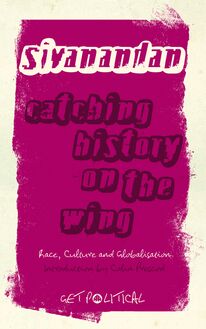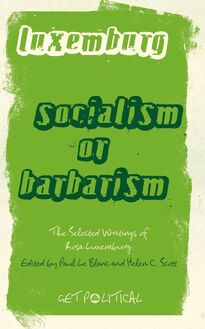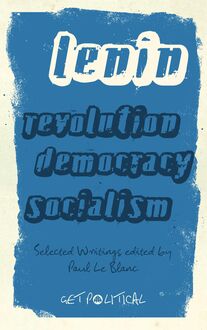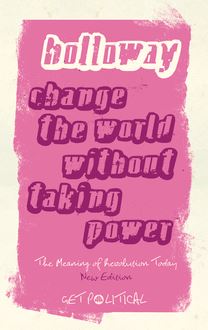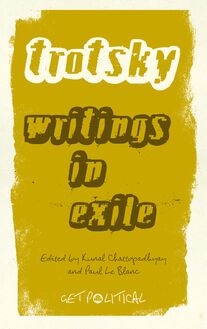Change the World Without Taking Power , livre ebook
157
pages
English
Ebooks
2010
Vous pourrez modifier la taille du texte de cet ouvrage
Obtenez un accès à la bibliothèque pour le consulter en ligne En savoir plus
Découvre YouScribe en t'inscrivant gratuitement
Découvre YouScribe en t'inscrivant gratuitement
157
pages
English
Ebooks
2010
Vous pourrez modifier la taille du texte de cet ouvrage
Obtenez un accès à la bibliothèque pour le consulter en ligne En savoir plus
Publié par
Date de parution
06 septembre 2010
Nombre de lectures
1
EAN13
9781783710454
Langue
English
After a century of failed attempts by revolutionary and reformist movements to bring about radical social change, the concept of revolution itself is in crisis. John Holloway opens up the theoretical debate, reposing some of the basic concepts of Marxism in a critical development of the subversive Marxist tradition represented by Adorno, Bloch and Lukacs, amongst others, and grounded in a rethinking of Marx's concept of 'fetishisation' - how doing is transformed into being.
Acknowledgements
Preface to the New Edition
Preface to the First Edition
1. The Scream
2. Beyond the State?
3. Beyond Power?
4. AFetishism - The Tragic Dilemma
5. Fetishism and Fetishisation
6. Anti-Fetishism and Criticism
7. The Tradition of Scientific Marxism
8. The Critical-Revolutionary Subject
9. The Material Reality of Anti-Power
10. The Material Reality of Anti-Power and the Crisis of Capital
11. Revolution?
12. Epilogue to new edition: Moving Against and Beyond: Reflections on a Discussion
Notes
Bibliography
Index
Publié par
Date de parution
06 septembre 2010
Nombre de lectures
1
EAN13
9781783710454
Langue
English
Change the World Without Taking Power
www.plutobooks.com
The Communist Manifesto Introduction by David Harvey 9780745328461
Revolution, Democracy, Socialism Edited by Paul Le Blanc 9780745327600
Catching History On The Wing Foreword by Colin Prescod 9780745328348
Black Skin, White Masks Forewords by Homi K. Bhabha and Ziauddin Sardar 9780745328485
Jewish History, Jewish Religion Forewords by Pappe / Mezvinsky / Said / Vidal 9780745328409
Theatre of the Oppressed 9780745328386
Staying Power Introduction by Paul Gilroy 9780745330723
Change the World Without Taking Power 9780745329185
Socialism or Barbarism Edited by Paul Le Blanc and Helen C. Scott 9780745329888
First published 2002 and 2005 by Pluto Press 345 Archway Road, London N6 5AA and 175 Fifth Avenue, New York, NY 10010
www.plutobooks.com
Distributed in the United States of America exclusively by Palgrave Macmillan, a division of St. Martin s Press LLC, 175 Fifth Avenue, New York, NY 10010
Copyright John Holloway 2002, 2005, 2010
The right of John Holloway to be identified as the author of this work has been asserted by him in accordance with the Copyright, Designs and Patents Act 1988.
British Library Cataloguing in Publication Data A catalogue record for this book is available from the British Library
ISBN 978 0 7453 2919 2 hardback ISBN 978 0 7453 2918 5 paperback ISBN 978 1 7837 1045 4 ePub
This book is printed on paper suitable for recycling and made from fully managed and sustained forest sources. Logging, pulping and manufacturing processes are expected to conform to the environmental standards of the country of origin.
10 9 8 7 6 5 4 3
Designed and produced for Pluto Press by Chase Publishing Services Ltd, Sidmouth EX10 9JB Typeset from disk by Stanford DTP Services, Northampton Printed in the European Union by CPI Antony Rowe, Chippenham, England
Contents
Acknowledgements
Preface to the First Edition
Preface to the New Edition
1. The Scream
2. Beyond the State?
3. Beyond Power?
4. Fetishism: The Tragic Dilemma
5. Fetishism and Fetishisation
6. Anti-Fetishism and Criticism
7. The Tradition of Scientific Marxism
8. The Critical-Revolutionary Subject
9. The Material Reality of Anti-Power
10. The Material Reality of Anti-Power and the Crisis of Capital
11. Revolution?
Epilogue: Moving Against-and-Beyond - Reflections on a Discussion
Notes
Bibliography
Name Index
Subject Index
Acknowledgements
There are an awful lot of people to thank for their help in producing this book.
First, my thanks to Elo na Pel ez, whose mephistophelean presence moves through every word, dot and comma of the book, and without whom I could never even have imagined the unity of constitution and existence: not duration, but nunc stans.
To Werner Bonefeld, Richard Gunn and now Sergio Tischler I owe a great deal for countless shared seminars and discussions over the years, for their support and for their very valuable comments on various stages of this text.
I have been very fortunate in being able to discuss both the text in detail and related ideas with the members of the seminar group on Subjectivity and Critical Theory in the Instituto de Ciencias Sociales y Humanidades in Puebla: to all involved, very many thanks. Two trips to Argentina have also played an important part in helping me to crystallise the ideas contained in this book: the first, to give a seminar in the Instituto Argentino de Desarrollo Econ mico, organised by Gustavo Roux and Eliseo Giai; the second to give a week-long intensive seminar on the first draft of the book in the Facultad de Filosof a y Letras in Rosario, organised by Gladys Rimini and Gustavo Guevara: to the organisers and all the participants my deepest thanks. And, while in Argentina, a very special thanks to Alberto Bonnet, Marcela Zangaro and N stor L pez for their constant help and encouragement. Jumping from the other side of the world, from Argentina to Scotland, I owe much to the long-term inspiration and encouragement of George Wilson, Eileen Simpson, Maggie Sinclair, Rod MacKenzie, Vassiliki Kolocotroni and Olga Taxidou.
My sincerest thanks too to those others who have been kind enough to comment, often in great detail, on drafts of this book: Simon Susen, Ana Dinerstein, Jorge Luis Acanda, Chris Wright, Jos Manuel Mart nez, Cyril Smith, Massimo de Angelis, Rowan Wilson, Ana Esther Cece a, Enrique Rajchenberg, Patricia King, Javier Villanueva and Lars Stubbe. To Steve Wright, thanks for last-minute help with a quotation.
Change the World Without Taking Power vii
To Roberto V lez Pliego, Director of the Instituto de Ciencias Sociales of the Benem rita Universidad Aut noma de Puebla, heartfelt thanks for his support and for helping to make the Institute an exceptional place to work.
To Aidan, Anna-Maeve and Mariana Holloway, thanks for making the abandonment of hope unthinkable.
To the many others who have helped and encouraged, but whom I do not mention here, please accept my thanks and remember that identification is domination.
Preface to the First Edition
This book was already in the publishing process before the attacks on the World Trade Center occurred, before the bombing of Afghanistan began.
The scream with which the book begins has become louder and more anguished since that date as we witness the arrogant stupidity of those who kill, those who bomb, those who would destroy the human race. The call to think about how we can change the world without entering into the pursuit of power is more urgent than ever.
Most terrible of all is the feeling of helplessness as we watch the televised bombs falling and the bodies being pulled from the rubble. How, in spite of everything, can we understand our own force, our own capacity to create a different world? That is the issue that this book seeks to address.
The deepening world recession is the other phenomenon which has changed since I submitted the manuscript to Pluto Press. I have done nothing to add new data to the discussion of crisis in Chapter 10, but the argument is given extra force by current developments. Again the central issue is: how do we overcome the feeling of helplessness that seems now to pervade everything? How do we understand that, in relation to the crisis as in relation to the war, we are not victims but subjects, the only subjects?
Preface to the New Edition
I am delighted that this book is being published in a new edition, eight years after it first appeared in 2002. Like any author, I want the book to have a life beyond the immediate context into which it was born.
Certainly the moment into which the book was born was important for the impact it made. Nowhere was that clearer than in Argentina: when I presented the book in Buenos Aires in late 2002, there were well over a thousand people at the presentation - for me a scary and exhilarating indication of the way in which the idea of changing the world without taking power was an integral part of the social and political upheaval of that moment, the upsurge of neighbourhood assemblies, recovered factories, piqueteros and massive demonstrations that overthrew several presidents in a matter of weeks. But not only Argentina: Change the World Without Taking Power gave voice to an idea that was central to the alter-globalisation movement, to the Zapatista uprising in Mexico, to at least part of the great upheaval in Bolivia in those years and to the everyday practice of so many and many and many groups throughout the world, struggling to find a way forward, a different way of changing society, clear in their repudiation of the old state-centred politics and all that it involves in terms of corruption and boredom and using people as means to an end.
The moment undoubtedly contributed to the impact that the book has had and the storm of discussion it has aroused. At times I have felt that I am standing at the edge of the sea, being bowled over by one wave of commentary after another, the first full of praise, the next absolute and angry condemnation. Each wave, I confess, has been a source of delight. The aim of the book is not just to convince people that radical social change does not lie through the state, but equally to draw people into a discussion of the meaning of revolution, of how we can create a different world. The argument against the state is an argument against a politics of monologue. Anti-capitalist opposition is and must be polymorphous, polyvocal, polylogical, necessarily discordant: a We who argue among ourselves, and who constitute our We by arguing. The book has now been translated into ten other languages and seems to have sparked off both anger and enthusiasm in all of them. The whole debate led me to write a reflection on the main issues as an epilogue to the new expanded edition published by Pluto in 2005 and which is included in this, the third edition.
My hope is that this new edition will stir up the same anger and enthusiasm as its predecessors. In a discussion a few months ago, a friend suggested that this was a book that was important in its moment, but perhaps that moment has passed. Times and theoretical needs have moved on. I like my friend, but I do not agree.
Certainly, the scream with which the book starts, and which is central to its argument, is still there, louder, more piercing, more anguished. Capitalism is nastier, more violent, more unjust, more destructive. Since the outbreak of the financial crisis, it no longer even has the appearance of working efficiently. And now it is more obvious than before that the continued reproduction of capitalism would probably mean the extinction of human life on earth.
Revolution, in the sense of radical social change, is more urgent than ever. That is an easy point of agreement, not even a contentious statement. To say We need revolutionary change is an obvious statement that should be repeated very often, shouted from the rooftops. The fact that it
